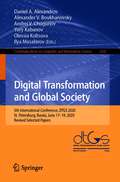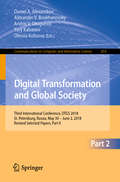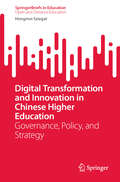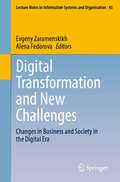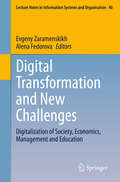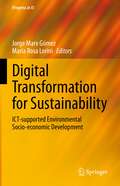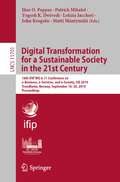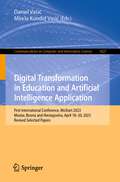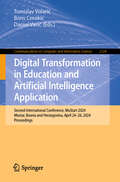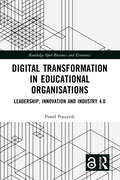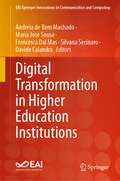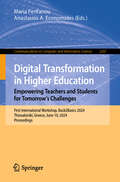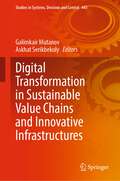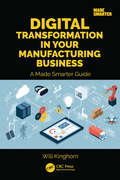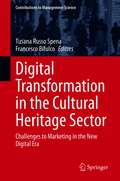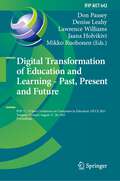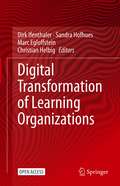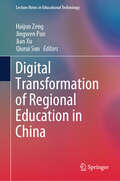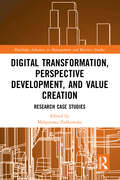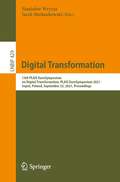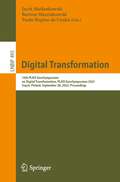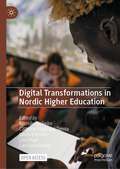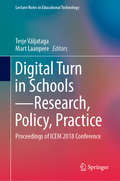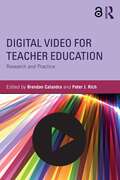- Table View
- List View
Digital Transformation and Global Society: 5th International Conference, DTGS 2020, St. Petersburg, Russia, June 17–19, 2020, Revised Selected Papers (Communications in Computer and Information Science #1242)
by Olessia Koltsova Andrei V. Chugunov Yury Kabanov Daniel A. Alexandrov Alexander V. Boukhanovsky Ilya MusabirovThis volume constitutes refereed proceedings of the 5th International Conference on Digital Transformation and Global Society, DTGS 2020, held in St. Petersburg, Russia, in June 2020. Due to the COVID-19 pandemic the conference was held online. The 30 revised full papers and 6 short papers presented in the volume were carefully reviewed and selected from 108 submissions. The papers are organized in topical sections on e-society: virtual communities and online activism; e-society: computational social science; e-polity: governance and politics on the Internet; e-city: smart cities and urban governance; e-economy: digital economy and consumer behavior; e-humanities: digital culture and education; e-health: international workshop "E-Health: 4P-medicine & Digital Transformation".
Digital Transformation and Global Society: Third International Conference, DTGS 2018, St. Petersburg, Russia, May 30 – June 2, 2018, Revised Selected Papers, Part II (Communications in Computer and Information Science #859)
by Olessia Koltsova Andrei V. Chugunov Yury Kabanov Daniel A. Alexandrov Alexander V. BoukhanovskyThis two volume set (CCIS 858 and CCIS 859) constitutes the refereed proceedings of the Third International Conference on Digital Transformation and Global Society, DTGS 2018, held in St. Petersburg, Russia, in May/June 2018.The 75 revised full papers and the one short paper presented in the two volumes were carefully reviewed and selected from 222 submissions. The papers are organized in topical sections on e-polity: smart governance and e-participation, politics and activism in the cyberspace, law and regulation; e-city: smart cities and urban planning; e-economy: IT and new markets; e-society: social informatics, digital divides; e-communication: discussions and perceptions on the social media; e-humanities: arts and culture; International Workshop on Internet Psychology; International Workshop on Computational Linguistics.
Digital Transformation and Innovation in Chinese Higher Education: Governance, Policy, and Strategy (SpringerBriefs in Education)
by Hongmei SziegatThis book presents the development of digital transformation and innovation in Chinese higher education. It conducts policy analysis and critical discourse analysis of national policies and initiatives. It focuses on organizational perspectives to explore how conventional and open universities respond to digital transformation and innovation through multiple case studies. It conducts impacts of digital transformations on technical, socio-cultural, economic and pedagogical changes, including changes in structural and regulatory frameworks at the organisational and policy levels. It identifies challenges in digital transformation and innovation in Chinese higher education and proposes recommendations for strategies and governance. It shows the future perspectives on digital transformation and innovation in Chinese Higher Education. This study could be used to as a reference for digital transformation and innovation in higher education institutions in Asia and beyond.
Digital Transformation and New Challenges: Changes in Business and Society in the Digital Era (Lecture Notes in Information Systems and Organisation #45)
by Evgeny Zaramenskikh Alena FedorovaThis book gathers the best papers presented at the second conference held by the Russian chapter of the Association for Information Systems (AIS), which took place in Yekaterinburg, Russian Federation, in December 2019. It shares the latest insights into various aspects of the digitalization of the economy and the consequences of transformation in public administration, business and public life. Integrating a broad range of analytical perspectives, including economic, social and technological, this interdisciplinary book is particularly relevant for scientists, digital technology users, companies and public institutions.
Digital Transformation and New Challenges: Digitalization of Society, Economics, Management and Education (Lecture Notes in Information Systems and Organisation #40)
by Evgeny Zaramenskikh Alena FedorovaThis book gathers the best papers presented at the first conference held by the Russian chapter of the Association for Information Systems (AIS). It shares the latest insights into various aspects of the digitalization of the economy and the consequences of transformation in public administration, business and public life. Integrating a broad range of analytical perspectives, including economic, social and, technological, this interdisciplinary book is particularly relevant for scientists, digital technology users, companies and public institutions.
Digital Transformation for Sustainability: ICT-supported Environmental Socio-economic Development (Progress in IS)
by Jorge Marx Gómez Maria Rosa LoriniThis book presents case studies to analyse the relationship between sustainability – environmental, social, institutional and economic – and digital innovation. The respective contributions offer a contextualisation of the main present and future trends concerning these two elements, and present analyses from economic, technical, managerial, and social perspectives alike. The individual sections of the book focus on interactions between sustainability and digital innovation in existing organisations and highlight the new opportunities, challenges and threats that may emerge as a result. The contributions are mainly based on case studies and research conducted in Europe and Africa, with a few focusing on Southeast Asia and Central America, and were prepared by experts in the fields of Information Systems, Computer Science, Social Development, and Economics.
Digital Transformation for a Sustainable Society in the 21st Century: 18th IFIP WG 6.11 Conference on e-Business, e-Services, and e-Society, I3E 2019, Trondheim, Norway, September 18–20, 2019, Proceedings (Lecture Notes in Computer Science #11701)
by Yogesh K. Dwivedi John Krogstie Matti Mäntymäki Letizia Jaccheri Ilias O. Pappas Patrick MikalefThis book constitutes the proceedings of the 18th IFIP WG 6.11 Conference on e-Business, e-Services, and e-Society, I3E 2019, held in Trondheim, Norway, in September 2019. The total of 61 full and 4 short papers presented in this volume were carefully reviewed and selected from 138 submissions. The papers were organized in topical sections named: e-business; big data analytics, open science and open data; artificial intelligence and internet of things; smart cities and smart homes, social media and analytics; digital governance; digital divide and social inclusion; learning and education; security in digital environments; modelling and managing the digital enterprise; digital innovation and business transformation; and online communities.
Digital Transformation in Education and Artificial Intelligence Application: First International Conference, MoStart 2023, Mostar, Bosnia and Herzegovina, April 18–20, 2023, Revised Selected Papers (Communications in Computer and Information Science #1827)
by Daniel Vasić Mirela Kundid VasićThis book constitutes selected papers presented during the First International Conference on Digitization in Education, MoStart 2023, held in Mostar, Bosnia and Herzegovina, in April 2023.The 12 presented papers were thoroughly reviewed and selected from the 30 submissions. The proceedings cover a diverse range of topics, including artificial intelligence and robotics in education, games and simulations, intelligent tutoring systems, augmented and virtual reality, natural language processing, computer vision, IoT and metaverse applications, learning analytics, deep learning, and ethical issues in AI applications in education and law.
Digital Transformation in Education and Artificial Intelligence Application: Second International Conference, MoStart 2024, Mostar, Bosnia and Herzegovina, April 24–26, 2024, Proceedings (Communications in Computer and Information Science #2124)
by Daniel Vasić Tomislav Volarić Boris CrnokićThis book constitutes selected papers presented during the Second International Conference on Digital Transformation in Education and Artificial Intelligence Applications, MoStart 2024, held in Mostar, Bosnia and Herzegovina, in April 2024. The 17 papers were selected from the 32 submissions. The proceedings cover a broad range of topics, computer vision, natural language processing, and the latest advancements in the digital transformation of education. Notably, the application of artificial intelligence, the incorporation of gamification and robotics into learning processes, and innovative technologies such as IoT, have been thoroughly explored.
Digital Transformation in Educational Organizations: Leadership, Innovation and Industry 4.0 (Routledge Open Business and Economics)
by Paweł PoszytekTechnological transformation should lead to enhance people’s potential and the development of their cognitive and social competences, especially those connected with effective communication on different levels. The COVID-19 pandemic has intensified all these processes and, for better resilience and effectiveness at work, it requires now different sets of competences. This book gives direct insight into changes that take place in education in the context of an unprecedented and rapid technological advancement, which requires the reorientation of goals and functions based on innovative, adaptive and flexible solutions – in most cases driven by individual leadership. It describes the way to reach this reorientation and shows through thorough research how educational leaders position themselves on this way in this fast-changing ecosystem. Exploring how educational leaders manage the challenges of digital transformation, using European collaborative projects, this research volume discusses how this process impacts the effectiveness and sustainability of organizational activities. Establishing a model for assessing digital transformation in educational organizations and evaluating the effectiveness of their leaders, it will be of value to researchers, academics, practitioners, and advanced students in the fields of leadership, organizational change, management of technology and innovation, and those interested in the development of education and the utilization of digitalization.
Digital Transformation in Higher Education Institutions (EAI/Springer Innovations in Communication and Computing)
by Silvana Secinaro Maria José Sousa Andreia de Bem Machado Francesca Dal Mas Davide CalandraThis book analyzes digital technologies being used in the teaching-learning process. The authors show how the use of AI in higher education can provide personalized education through the automation of administrative teaching tasks, software programs that favor the detection of topics that need reinforcement in the classroom, the guidance and support of students outside the classroom, and the use of data intelligently to teach and support students. In addition, the authors show how to further personalize education with the use of augmented reality, adaptive platforms, intelligent tutor systems, Chatbots, adaptive learning, computer aided instruction, MOOCs, and robotics. The authors answer questions such as: What sustainable educational technologies can be used in the teaching-learning process; How can Blockchain technology and AI be applied in higher education; How can the metaverse be applied in virtual learning environments? The book is relevant to researchers, professionals, andstudents interested in technology and education.
Digital Transformation in Higher Education. Empowering Teachers and Students for Tomorrow’s Challenges: First International Workshop, Back2Basics 2024, Thessaloniki, Greece, June 10, 2024, Proceedings (Communications in Computer and Information Science #2247)
by Maria Perifanou Anastasios A. EconomidesThis book constitutes the refereed proceedings of the First International Workshop on Digital Transformation in Higher Education. Empowering Teachers and Students for Tomorrow’s Challenges, Back2Basics 2024, held in Thessaloniki, Greece, on June 10, 2024. This workshop was part of the 20th International Conference on Intelligent Tutoring Systems (ITS 2024), which took place in Thessaloniki on June 10–13, 2024. The 06 full papers here were thoroughly reviewed and selected from a total of 09 submissions. This interdisciplinary event brought together researchers and educators from various European higher education institutions to address the challenges and opportunities of digital transformation in higher education (HE).
Digital Transformation in Sustainable Value Chains and Innovative Infrastructures (Studies in Systems, Decision and Control #443)
by Galimkair Mutanov Askhat SerikbekulyThis book includes 15 works by scientists of the Eurasian region, which reveal the various stages of the life cycle of digital transformation The creation of value propositions and their distribution chains is important for the sustainable development of society.This view of sustainable value chains on the part of public administration and business, considering modern scientific research, reveals the problems of education and science in the formation of chains sustainability and their infrastructure.Modern views on the actual problems of the digital service in the creation of value propositions with the participation of development institutions, new educational technologies, and state regulation both at the level of the world community and at the level of individual countries are revealed.The problems of digital transformation of economic actors and industries at different stages of the chain of value creation from a position of sustainable development, innovation in the infrastructure of public administration markets are considered.This book is useful to the academic community and a new generation of infrastructure creators to identify vectors to support the innovative development of value chains.
Digital Transformation in Your Manufacturing Business: A Made Smarter Guide
by Will KinghornAre you a manufacturing leader and unsure of which technology can help grow your business? Have you heard about 3D printing, Industry 4.0, robots, or artificial intelligence but don’t know how they can be used in manufacturing?This book gives a clear and practical guide to manufacturing technologies, providing examples of how they’re used, as well as the tools and techniques you’ll need to get started. Each technology is covered in a brief and simple way allowing you to understand it quickly and decide if it’s worth investigating for your business.In addition to this book, the online resources will provide you with templates and examples to help you get started. At every stage there are suggestions for the key terms you will need to find more information appropriate to your industry.This isn’t just about technology, it’s a roadmap for your digital transformation. Start with guidance on setting your company’s vision and direction, to getting the people in your business engaged and ready to adopt technology. Move on to exploring each of the technologies, and the tools and techniques you’ll find useful along the way. Finally, connect the technologies with the tools that are appropriate, and look at common issues in manufacturing businesses and how these can be resolved.Get started with making informed decisions, embracing technologies, and transforming your business.
Digital Transformation in the Cultural Heritage Sector: Challenges to Marketing in the New Digital Era (Contributions to Management Science)
by Tiziana Russo Spena Francesco BifulcoThis book devises an alternative conceptual framework to understand digital transformation in the cultural heritage sector. It achieves this by placing a high importance on the role of technology in the strategic process of modeling and developing cultural services in the digital era. The focus is on how marketing activities and customer processes are being transformed by digital technologies to create better value, which can also be communicated to customers through an engaged and personalized approach. Much of the digital debate in cultural heritage is still in infancy. Some existing studies are anecdotal and often developed within the domain of established research streams, including studies with some technological aspects addressed partially and from an episodic or periodic perspective. Moreover, the critical changes that have emerged in the cultural management landscape are yet to be highlighted. This book fills that gap and provides a perspective on the cultural heritage sector, which uses the new social and technology landscape to describe the digital transformation in cultural heritage sectors. The authors highlight an inclusive perspective that addresses marketing strategy in the digital era as a proactive, technology-enabled process by which firms collaborate with customers to jointly create, communicate, deliver, and sustain experience and value co-creation.
Digital Transformation of Education and Learning - Past, Present and Future: IFIP TC 3 Open Conference on Computers in Education, OCCE 2021, Tampere, Finland, August 17–20, 2021, Proceedings (IFIP Advances in Information and Communication Technology #642)
by Don Passey Mikko Ruohonen Lawrence Williams Denise Leahy Jaana HolvikiviThis book constitutes the refereed post-conference proceedings of the IFIP TC 3 Open Conference on Computers in Education, OCCE 2021, held in Tampere, Finland, in August 2021. The 22 full papers and 2 short papers included in this volume were carefully reviewed and selected from 44 submissions. The papers discuss key emerging topics and evolving practices in the area of educational computing research. They are organized in the following topical sections: Digital education across educational institutions; National policies and plans for digital competence; Learning with digital technologies; and Management issues.
Digital Transformation of Learning Organizations
by Dirk Ifenthaler Sandra Hofhues Marc Egloffstein Christian HelbigThis open access volume provides insight into how organizations change through the adoption of digital technologies. Opportunities and challenges for individuals as well as the organization are addressed. It features four major themes: 1. Current research exploring the theoretical underpinnings of digital transformation of organizations. 2. Insights into available digital technologies as well as organizational requirements for technology adoption. 3. Issues and challenges for designing and implementing digital transformation in learning organizations. 4. Case studies, empirical research findings, and examples from organizations which successfully adopted digital workplace learning.
Digital Transformation of Regional Education in China (Lecture Notes in Educational Technology)
by Jian Xu Haijun Zeng Jingwen Pan Qiurui SunThis book presents the best practices of smart education in different regions across China. Each chapter addresses one or more of the following topics: smart learning environments, new education and teaching models, teaching platforms and digital tool applications, teacher professional development, smart education evaluation, education governance, and education digitization. This edited collection promotes digital integration and innovative development of education, improves regional education levels, and ultimately forms a new model to support and lead the modernization of education in China.
Digital Transformation, Perspective Development, and Value Creation: Research Case Studies (Routledge Advances in Management and Business Studies)
by Małgorzata PańkowskaThis edited collection aims to provide relevant theoretical frameworks and the latest empirical research findings in the area of business management. It covers case studies provided by teachers visiting the University of Economics in Katowice, Poland, within Erasmus and CEEPUS Programmes. Over 12 years, approximately 25 teachers have been coming year by year to Katowice, presenting their monographic lectures and participating in seminars on their research results and educational achievements. This book contains descriptions of case studies, elaborated by Erasmus and CEEPUS teachers, illustrating that the case study is a method of research as well as a method applied in education and emphasizing the value of qualitative methods by example of case studies. The key benefit of qualitative research is that it allows a researcher to perceive and understand context within which decisions and actions take place. Hence, to understand peoples’ motivations, their reasons, their actions, and the context for their beliefs and actions, qualitative research is the best route. Assuming that business organizations as well as individuals are entirely linked together via the Internet, a new approach to business communication and marketing, business modelling and management are developed to reveal an increase of business synergy effects, the alignment of information and communication technologies (ICT) and business and social value creation, as well as sustainability and environment protection. Through this book, readers have an opportunity to learn about relevance and rigor in qualitative research and how the case study can be applied in various organizational contexts.
Digital Transformation: 13th PLAIS EuroSymposium on Digital Transformation, PLAIS EuroSymposium 2021, Sopot, Poland, September 23, 2021, Proceedings (Lecture Notes in Business Information Processing #429)
by Stanisław Wrycza Jacek MaślankowskiThis book constitutes the refereed proceedings of the 13th PLAIS EuroSymposium 2021 which was held in Sopot, Poland, on September 23, 2021. The objective of the PLAIS EuroSymposium 2021 is to promote and develop high quality research on all issues related to digital transformation. It provides a forum for IS researchers and practitioners in Europe and beyond to interact, collaborate, and develop this field. The 10 papers presented in this volume were carefully reviewed and selected from 34 submissions. They were organized in topical sections named: digital enterprises; smart cities; digital education; and innovative methods in data and process analysis.
Digital Transformation: 15th PLAIS EuroSymposium on Digital Transformation, PLAIS EuroSymposium 2023, Sopot, Poland, September 28, 2023, Proceedings (Lecture Notes in Business Information Processing #495)
by Paulo Rupino da Cunha Jacek Maślankowski Bartosz MarcinkowskiThis book constitutes the proceedings of the 15th PLAIS EuroSymposium on Digital Transformation, PLAIS EuroSymposium 2023, which took place in Sopot, Poland, in September 2023. The primary objective of the PLAIS EuroSymposium 2023 was to foster discussions on general issues pertaining to digital transformation and related topics. The papers selected this year are related to the use of machine learning, internet of things and social media. The 7 full papers included in this volume were carefully reviewed and selected from a total of 22 submissions.
Digital Transformations in Nordic Higher Education
by Rómulo Pinheiro Lars Geschwind Cathrine Edelhard Tømte Linda Barman Lise DegnThis open access book expands the scholarly and policy debates surrounding digital transformation in higher education. The authors adopt a pluralistic conceptual framework which uncovers three analytical elements – contexts, mediations, and type of effects – for unpacking empirical manifestations. The publicly funded higher education systems in Nordic countries provide solid empirical insights into how digital transformations have gained ground before and during the COVID-19 pandemic, and chapter contributions demonstrate how international digitalisation trends (such as in the global EdTech industry) impact on the core activities of higher education institutions (HEIs). The findings underscore the importance of assessments that consider multiple sub-systems within HEIs, as well as the complex relationships between them. By unpacking Nordic dynamics in the light of global processes and developments, the approach adopted and the results generated are of relevance to a much broader, global audience of students and researchers in higher education.
Digital Turn in Schools—Research, Policy, Practice: Proceedings of ICEM 2018 Conference (Lecture Notes in Educational Technology)
by Mart Laanpere Terje VäljatagaThis volume is a compilation of selected papers that were presented at the annual conference of the International Council of Educational Media (ICEM) in Tallinn, Estonia, on September 5 - 7, 2018. The book reports on recent interdisciplinary research and innovative practices regarding school-wide implementation of digital innovation and connects it with recent developments in the field of educational media. The key concept is “Digital Turn,” which is understood as a socio-technical transition towards next-generation digital learning ecosystems in education. Although Digital Turn can also be implemented at the classroom or national levels, most of the contributions in this volume take a whole-school perspective on the policies and practices regarding digital innovation, educational media, e-assessment, digital competences of teachers and students as well as learning design and learning analytics.
Digital Ultraviolet and Infrared Photography (Applications in Scientific Photography)
by Adrian DaviesDigital Ultraviolet and Infrared Photography discusses the growing number of applications of ultraviolet and infrared photography. Scientific and technical photographers, such as those engaged in scientific, medical, forensic, and landscape and wildlife photography routinely use ultraviolet and infrared techniques, and these techniques are growing in use in creative photography. This is the first book to address the application and potential for both ultraviolet and infrared photography in both science and art. The author, Adrian Davies, discusses the how-to of ultraviolet and infrared digital recording with a dissection of techniques, camera requirements and camera conversion, a useful appendix of resources and equipment currently available and inspirational image examples throughout. Digital Ultraviolet and Infrared Photography is an essential read for photographers using these tools either professionally or creatively.
Digital Video for Teacher Education: Research and Practice
by Peter J. Rich Brendan CalandraDigital video use is becoming prevalent in teacher education as a tool to help improve teaching and learning and for assessing effective teaching. Timely and comprehensive, this volume brings together top scholars from multiple disciplines to provide sound theoretical frameworks, research-based support, and clear practical advice on a variety of unique approaches to using digital video in teacher education programs. Part I deals with the use of video for teacher learning. Part II focuses on the role played by those other than teachers in the effective use of digital video in teacher education programs. Part III addresses how to administer video for teacher education. Exploring the complexities of effectively and appropriately integrating digital video into teacher development at various stages, this book is a must-have resource for scholars and professionals in the field.
